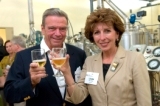Posts Tagged: energy conservation
World's first LEED Platinum winery, brewery and food-processing labs
A new winery, brewery and food-processing complex at the University of California, Davis, is the most environmentally sophisticated complex of its kind in the world, one that promises to unravel scientific enigmas and solve practical problems related to foods, beverages and health.
The $20 million, 34,000-square-foot teaching-and-research complex is the first winery, brewery or food-processing facility expected to earn LEED Platinum certification, the highest environmental rating awarded by the U.S. Green Building Council. It is intended to become self-sustainable in energy and water use.
Neal Van Alfen, dean of the College of Agricultural and Environmental Sciences at UC Davis, said, "It will serve as a model for industries throughout the nation that are also committed both to environmental excellence and production efficiency."
The complex houses a brewery, general foods-processing plant, milk-processing laboratory, and a teaching-and-research winery which will serve as a test bed for production processes that conserve water, energy, and other resources. The complex is adjacent to a 12-acre teaching-and-research vineyard.
Its environmentally friendly features include on-site solar power generation, a large-capacity system for capturing rainwater and conserving processing water, and many other features. The facility is expected to be carbon zero in carbon emissions.
Read more about the facility and take an online tour at the facility’s website.




